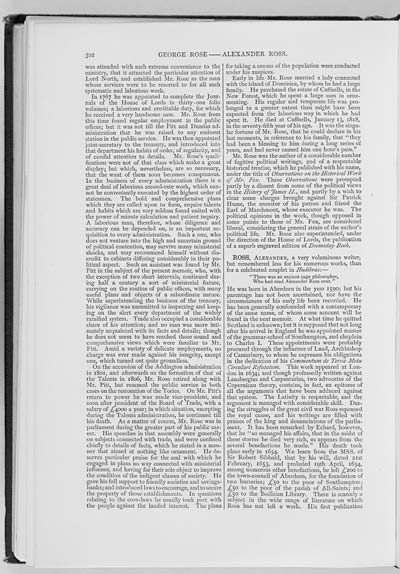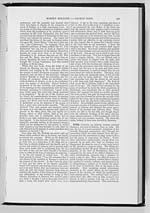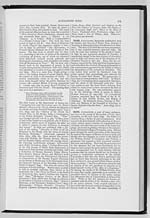302
was attended with such extreme convenience to the
ministry, that it attracted the particular attention of
Lord North, and established Mr. Rose as the man
whose services were to be resorted to for all such
systematic and laborious work.
In 1767 he was appointed to complete the Jour-
nals of the House of Lords in thirty-one folio
volumes; a laborious and creditable duty, for which
he received a very handsome sum. Mr. Rose from
this time found regular employment in the public
offices; but it was not till the Pitt and Dundas ad-
ministration that he was raised to any eminent
station in the public service. He was then appointed
joint-secretary to the treasury, and introduced into
that department his habits of order, of regularity, and
of careful attention to details. Mr. Rose's quali-
fications were not of that class which make a great
display; but which, nevertheless, are so necessary,
that the want of them soon becomes conspicuous.
In the business of every administration there is a
great deal of laborious second-rate work, which can-
not be conveniently executed by the highest order of
statesmen. The bold and comprehensive plans
which they are called upon to form, require talents
and habits which are very seldom found united with
the power of minute calculation and patient inquiry.
A laborious man, therefore, whose diligence and
accuracy can be depended on, is an important ac-
quisition to every administration. Such a one, who
does not venture into the high and uncertain ground
of political contention, may survive many ministerial
shocks, and may recommend himself without dis-
credit to cabinets differing considerably in their po-
litical aspect. Such an assistant was found by Mr.
Pitt in the subject of the present memoir, who, with
the exception of two short intervals, continued dur-
ing half a century a sort of ministerial fixture,
carrying on the routine of public offices, with many
useful plans and objects of a subordinate nature.
While superintending the business of the treasury,
his vigilance was unremitted in inspecting and keep-
ing on the alert every department of the widely
ramified system. Trade also occupied a considerable
share of his attention; and no man was more inti-
mately acquainted with its facts and details; though
he does not seem to have reached those sound and
comprehensive views which were familiar to Mr.
Pitt. Amid a variety of delicate employments, no
charge was ever made against his integrity, except
one, which turned out quite groundless.
On the accession of the Addington administration
in 1801, and afterwards on the formation of that of
the Talents in 1806, Mr. Rose retired along with
Mr. Pitt, but resumed the public service in both
cases on the restoration of the Tories. On Mr. Pitt's
return to power he was made vice-president, and
soon after president of the Board of Trade, with a
salary of �4000 a year; in which situation, excepting
during the Talents administration, he continued till
his death. As a matter of course, Mr. Rose was in
parliament during the greater part of his public car-
eer. His speeches in that assembly were generally
on subjects connected with trade, and were confined
chiefly to details of facts, which he stated in a man-
ner that aimed at nothing like ornament. He de-
serves particular praise for the zeal with which he
engaged in plans no way connected with ministerial
influence, and having for their sole object to improve
the condition of the indigent classes of society. He
gave his full support to friendly societies and savings-
banks ; and introduced laws to encourage, and to secure
the property of those establishments. In questions
relating to the corn-laws he usually took part with
the people against the landed interest. The plans
for taking a census of the population were conducted
under his auspices.
Early in life Mr. Rose married a lady connected
with the island of Dominica, by whom he had a large
family. He purchased the estate of Cuffnells, in the
New Forest, which he spent a large sum in orna-
menting. His regular and temperate life was pro-
longed to a greater extent than might have been
expected from the laborious way in which he had
spent it. He died at Cuffnells, January 13, 1818,
in the seventy-fifth year of his age. It was the singu-
lar fortune of Mr. Rose, that he could declare in his
last moments, in reference to his family, that "they
had been a blessing to him during a long series of
years, and had never caused him one hour's pain."
Mr. Rose was the author of a considerable number
of fugitive political writings, and of a respectable
historical treatise, which he published with his name,
under the title of Observations on the Historical Work
of Mr. Fox. These Observations were prompted
partly by a dissent from some of the political views
in the History of James II., and partly by a wish to
clear some charges brought against Sir Patrick
Hume, the ancestor of his patron and friend the
Earl of Marchmont, whose executor he was. The
political opinions in the work, though opposed in
some points to those of Mr. Fox, are considered
liberal, considering the general strain of the author's
political life. Mr. Rose also superintended, under
the direction of the House of Lords, the publication
of a superb engraved edition of Doomsday Book.
ROSS, ALEXANDER, a very voluminous writer,
but remembered less for his numerous works, than
for a celebrated couplet in Hudibras:�
"There was an ancient sage philosopher,
Who had read Alexander Ross over."
He was born in Aberdeen in the year 1590; but his
parentage has not been ascertained, nor have the
circumstances of his early life been recorded. He
has been generally confounded with a contemporary
of the same name, of whom some account will be
found in the next memoir. At what time he quitted
Scotland is unknown; but it is supposed that not long
after his arrival in England he was appointed master
of the grammar-school of Southampton, and chaplain
to Charles I. These appointments were probably
procured through the influence of Laud, Archbishop
of Canterbury, to whom he expresses his obligations
in the dedication of his Commentum de Terra Motu
Circulari Refutatum. This work appeared at Lon-
don in 1634; and though professedly written against
Lansbergius and Carpentarius, two advocates of the
Copernican theory, contains, in fact, an epitome of
all the arguments that have been adduced against
that system. The Latinity is respectable, and the
argument is managed with considerable skill. Dur-
ing the struggles of the great civil war Ross espoused
the royal cause, and his writings are filled with
praises of the king and denunciations of the parlia-
ment. It has been remarked by Echard, however,
that he "so managed his affairs, that in the midst of
these storms he died very rich, as appears from the
several benefactions he made." His death took
place early in 1654. We learn from the MSS. of
Sir Robert Sibbald, that by his will, dated 21st
February, 1653, and probated 19th April, 1654,
among numerous other benefactions, he left �200 to
the town-council of Aberdeen, for the foundation of
two bursaries; �50 to the poor of Southampton;
�50 to the poor of the parish of All-Saints; and
�50 to the Bodleian Library. There is scarcely a
subject in the wide range of literature on which
Ross has not left a work. His first publication

![]() Universal Viewer |
Universal Viewer | ![]() Mirador |
Large image | Transcription
Mirador |
Large image | Transcription
![]()

